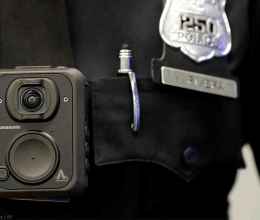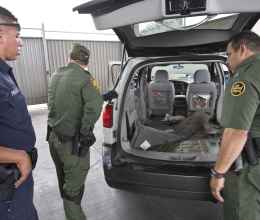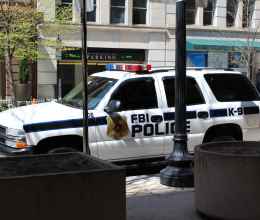Barajas is Believed to be the First Deported Vet to Receive Citizenship
TIJUANA — Deported U.S. Army veteran Hector Barajas, who has been living in Mexico the last eight years, today received word from the Department of Homeland Security that he is being granted U.S. citizenship. He is scheduled to be sworn in as a citizen in a few weeks in San Diego.
Barajas, a decorated vet who received an honorable discharge after serving nearly six years in the military, was granted a full pardon last year by Gov. Jerry Brown for a conviction that led to his deportation.
"This is great! I’m going home, ma!" he exclaimed amid tears as he received the news from Norma Chavez-Peterson, executive director of the ACLU Foundation of San Diego and Imperial Counties. He got the news in the "Bunker," the headquarters of the Deported Veterans Support House he established in Tijuana for departed veterans.
Getting hugs from his fellow vets, Barajas said he will keep up his efforts to get them all back in the U.S. "I'm not stopping for any of you guys," he said.
Barajas passed the English and civic portions of his naturalization requirements on November 18, 2016 but has been waiting since then for a decision. He filed a federal lawsuit in December 2017 to compel the agency to make a decision; that lawsuit was dismissed when the agency agreed to issue a decision by today. Now that he has been granted citizenship, he will be able to permanently return the United States.
"Finally, after years of fighting for the rights of deported veterans to return to the U.S., Hector will be able to return home as an American citizen," said Jennie Pasquarella, director of immigrants' rights for the ACLU Foundations of California and one of Barajas' attorneys.
"Hector, like a true soldier, has fought day in and day out since his deportation on behalf of deported veterans across the globe. He never gave up hope that he would one day return to his home and be reunited with his family."
James Erselius of the law firm Latham & Watkins LLP, who represented Barajas in his naturalization case, said Thursday, "I am ecstatic for Hector that he can finally return home and be reunited with his family. He absolutely deserves this. His citizenship also gives hope to other veterans like himself who were deported but are still seeking to come home."
Barajas will be the second of the deported veterans pardoned by Gov. Brown to return home. Marine Corps veteran Marco Chavez, who was sent to Mexico in 2002, was permitted to come back to the U.S. in December.
Barajas was born in Mexico but raised since he was seven in the Los Angeles area. In 1992, he became a lawful permanent resident. After graduating from high school, Barajas enlisted in the army in 1995 and could have applied for naturalization at that time, but army recruiters led him to the mistaken impression that honorable service in the military automatically made him a citizen.
During his military career, Barajas reached the rank of specialist and served in the 82nd Airborne Division. He received numerous accolades and awards, including the Army Commendation Medal and Humanitarian Service Medal. He was honorably discharged in 2001.
Barajas struggled upon his re-entry to civilian life and entered a plea of no contest in 2002 to a charge of shooting at an occupied vehicle. After spending two years in prison and nearly a year in detention, he was deported to Mexico. With his family in the U.S. and difficulties finding employment in Mexico, he re-entered the U.S. and was again deported in 2010 after being pulled over in a traffic stop.
Since that time, Barajas has devoted his life to helping other deported military veterans. He founded the Deported Veterans Support House, which provides housing, social services and legal resources for veterans. He has been a tireless advocate for deported veterans, and his work has earned the support of members of Congress and other state and local elected officials.
In April 2017, Gov. Brown pardoned him, issuing a statement that said Barajas "has shown that since his release from custody, he has lived an honest and upright life, exhibited good moral character and conducted himself as a law-abiding citizen."
The statement went on to mention Barajas's work with the Deported Veterans Support House and said he "has paid his debt to society and earned a full and unconditional pardon."


